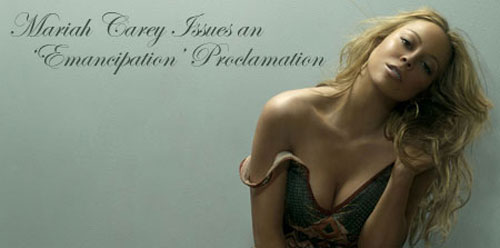Mariah Carey Issues an ‘Emancipation’ Proclamation

Cause it’s my night
No stress no fights
I’m leavin’ it all behind
No tears no time to cry
Just making the most of life
-“It’s Like That”
With The Emancipation of Mimi , Mariah Carey repudiates the rumor mills, negates the naysayers and opens up Her voice and soul to blaze a sensational return to the pinnacle of the charts. Co-writing all 14 tracks, Carey has created a lustrous suite of songs to celebrate her spiritual and professional renewal. Audiences are clearly primed, as the long awaited project is a resounding, out-of-thebox success.
Longtime fans of Carey’s signature, multi-octave balladry will delight in the glossy “We Belong Together,” as her lyrics reference listening to Bobby Womack and Babyface on the midnight radio. The retrovinyl crackle on “Mine Again” extends the legacy of classic soul that ignites with the sheer aural sensuality of “Joy Ride.”
It’s not all smooth silk and ballads, however; raising the temperature substantially, a hit-making host of hip-hop purveyors accompanies Carey squarely into the urban zone. Collaborating with Grammy-winning producers Pharrell Williams and Chad Hugo —The Neptunes — on “Say Somethin,’” she and her duet partner, Snoop Dogg, smolder in tandem with a club-heavy groove. Keeping it equally authentic, Jermaine Dupri, Twista and Nelly all individually join Carey on subsequent tracks. Bolstered by a sample of Thom Bell and Linda Creed’s “Betcha By Golly Wow” as recorded by The Ramsey Lewis Trio, “Stay the Night,” a track produced by Kanye West, perfectly epitomizes Carey’s enduring appeal: timeless soul amped up with nouveau hip-hop flourishes, sparkling with radiant star power. The cover photo says it best, portraying a voluptuous, wind blown Carey posing like a latter-day Greek goddess.
The daughter of a former opera singer and vocal coach — and even named for a song, “They Call the Wind Mariah,” from the Lerner and Loewe musical Paint Your Wagon , Carey, born on Long Island, New York, began vocalizing at the age of four, and was writing her own songs by the time she was attending Oldfield Middle School. The day after graduation from high school, she moved into Manhattan, where she sang backing vocals for a succession of artists, including Brenda K. Starr, who passed her demo on to Sony Music Entertainment chief Tommy Mottola at a party. As legend has it, when Mottola listened to the demo on his ride home, he subsequently commanded his driver to spin the limo around and return to the party so that he could meet the young singer. Soon afterwards, Mottola signed Carey to a Columbia Records contract, where he oversaw her meteoric rise, and eventually married her.
The Emancipation of Mimi, which Carey co-executive produced with her new label chief, Island/Def Jam’s Antonio “LA” Reid, continues an unprecedented lineage of hitmaking that began with her self-titled 1990 debut and four successive hit singles, “Vision of Love,” “Love Takes Time,” “Someday,” and “I Don’t Wanna Cry.” Her follow up, Music Box , continued her chart domination, selling an astounding 10 times platinum. Since these auspicious introductions, Mariah Carey has become the best-selling female performer of all time, with 16 number one singles capped by two Grammy Awards, eight American Music Awards, Billboard’s “Artist of the Decade” Award and the World Music Award for “World’s Best Selling Female Artist of the Millennium.” The only artist to top the charts in each year of the 1990s, with the single “Heartbreaker,” she even pushed ahead of The Beatles as the artist with the most cumulative weeks spent atop Billboard ’s Hot 100 Singles chart.
“Mimi” is a nickname that those close to Carey use to address her. This new found freedom, or “emancipation” as evidenced in the title, is given an emphatic dictionary definition on the CD booklet, “To free from the restraint, control, oppression, or power of another.” As she nails a door shut on the past, her lyrics proclaim the autonomy of her new life. “I was in a beautiful house, surrounded by beautiful things, but I couldn’t be who I really was,” she told a British magazine. Soon after her marital split came the movie Glitter , released the week after 9/11, that starred Carey in an acting role. Carey told the New York Post, “The problem was (that) Glitter was about a diva moment. It was too close to my life.” A well-publicized break from her next record label, Virgin, and recovery from exhaustion kept Carey in the trades and tabloids, if not on the charts, but even her record sale doldrums were relative. Both the soundtrack to Glitter and the follow-up, Charmbraclet , moved over a million copies in the U.S. alone.
Now, with her creativity renewed, Carey plans to pen a series of illustrated children’s tales following the life of a bi-racial orphan girl. The series will be based on experiences from the singer’s own childhood, growing up in a mixed-race family. She’s also hoping to translate an earlier album, her 1994 Merry Christmas, into a family-friendly Broadway show. She told MTV, “I get a chance to live out my Christmastime fantasies vicariously through the show. I think it’s going to be fun and something families can go to see.”
On “Fly Like a Bird,” the concluding track to The Emancipation of Mimi , Mariah takes it to church with the jubilant backing of a gospel choir as a disembodied voice intros the song with this quotation from Psalms, Chapter 30, verse five: “Weeping may endure for a night, but joy comes in the morning.” As she celebrates her liberation, like the bird she describes in song, Mariah Carey soars higher in a stratospheric arc of ever-ascending artistry.






Community
Connect with BMI & Professional Songwriters